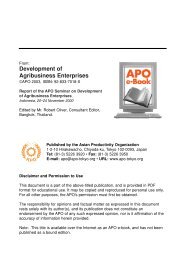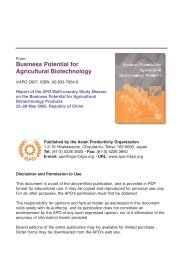Annual Report 2009 - Asian Productivity Organization
Annual Report 2009 - Asian Productivity Organization
Annual Report 2009 - Asian Productivity Organization
You also want an ePaper? Increase the reach of your titles
YUMPU automatically turns print PDFs into web optimized ePapers that Google loves.
Project on GMP for food hygiene improvement:<br />
A national seminar and training course on GMP were<br />
held 12–16 October in Vientiane. These were organized<br />
by the APO and implemented by SMEPDO.<br />
The seminar was held to enhance awareness of food<br />
hygiene and to understand the significance of GMP<br />
for the food-manufacturing industry. The training<br />
course was held after the seminar to provide basic<br />
knowledge of the applications of GMP in production<br />
sites. The seminar was attended by 74 participants<br />
from food-manufacturing companies, relevant ministries,<br />
and several universities. The training course was<br />
attended by 19 participants from food-manufacturing<br />
companies and one university.<br />
Advanced Technology for Greenhouse Farming<br />
Biotechnology and environmental control through<br />
greenhouse farming are currently the two locomotives<br />
in agricultural development. The Republic of Korea is<br />
one APO member country that has been successful in<br />
greenhouse farming.<br />
A multicountry Observational Study Meeting on<br />
Advanced Technology for Greenhouse Farming was<br />
organized by the APO to learn from the achievements<br />
of the Republic of Korea. It was implemented by<br />
the KPC, 16–20 February, with 23 participants from<br />
12 member countries in attendance. The mission<br />
objectives were to: study the institutional and policy<br />
arrangements for greenhouse farming in the host<br />
country; learn about modern technologies and approaches<br />
adopted in greenhouse farming; and observe<br />
the state-of-the-art technologies for this type of<br />
farming.<br />
Program coverage: Considerations for greenhouse<br />
establishment and management; Aerial and rootzone<br />
environmental factors in greenhouse; Soilless<br />
culturing systems for greenhouse crop production;<br />
Environmental control methods and systems in greenhouses;<br />
Insect and disease control in greenhouses;<br />
and Greenhouse crop production and industry in<br />
Korea: State of the art. Site visits were made to: the<br />
Rural Development Administration in Suwon for<br />
an overview of greenhouse farming practices; Dasol<br />
Farm in Hwasung to observe greenhouse cultivation<br />
of “the marvel of Peru”; Hwasung 21 to observe<br />
greenhouse farming of paprika; Seje Orchid Farm to<br />
observe Phalenopsis greenhouse growth; Horticulture<br />
Research Institute in Dangjin; Korea-America Plug<br />
Seed Production Co.; and Lee Farm’s cucumber and<br />
tomato greenhouse.<br />
Food Traceability Systems for Agro- and Foodprocessing<br />
Industries<br />
A traceability system is a recordkeeping system for<br />
tracking the flow of products or product attributes<br />
through the production process or supply chain.<br />
Recently, food safety and quality are increasingly<br />
becoming more important concerns in agriculture and<br />
the food trade. Consumers are now more conscious of<br />
the quality and safety of the food they buy. They are<br />
also becoming more sensitive to production processes<br />
and practices and demand greater quality and safety<br />
assurances from agribusiness and food companies with<br />
reliable information. Against this background, policymakers<br />
and the agribusiness in many countries are<br />
considering the introduction of traceability systems to<br />
manage wide-ranging food-related issues.<br />
Graphic illustrations of the traceability system of Kewpie<br />
Corporation, Tokyo<br />
The APO organized a multicountry observational<br />
study mission on Food Traceability Systems for<br />
Agro- and Food-processing Industries, 10–13 March,<br />
in Japan to share recent developments in food<br />
safety management with the emphasis on traceability<br />
systems, examine current state-of-the-art technologies<br />
and techniques in applying traceability systems, and<br />
identify best practices for further promotion at SME<br />
level in member countries. It gathered 15 participants<br />
from 11 member countries and three resource<br />
persons.<br />
Program coverage: The state of traceability systems<br />
in Japan; Guidelines for the introduction of food<br />
traceability systems; and Case study of practices of<br />
traceability. Site visits were made to Sengawa Plant,<br />
Q.P. Co., Tokyo; Hanzawa Agricultural Cooperative,<br />
Saitama prefecture; Ota Tokyo Metropolitan Central<br />
Wholesale Market; Tokyo Seika, Tokyo; and two retail<br />
supermarkets in Tokyo, Queen’s Isetan Kinshicho<br />
and Ito Yokado Shin-kiba.<br />
Planning and Management of Rural-based Agroprocessing<br />
Enterprises<br />
The agroprocessing industry, particularly SMEs,<br />
promotes economic activities and rural development<br />
as it increases rural employment opportunities<br />
APO ANNUAL REPORT <strong>2009</strong> 51<br />
AGRICULTURE SECTOR
















